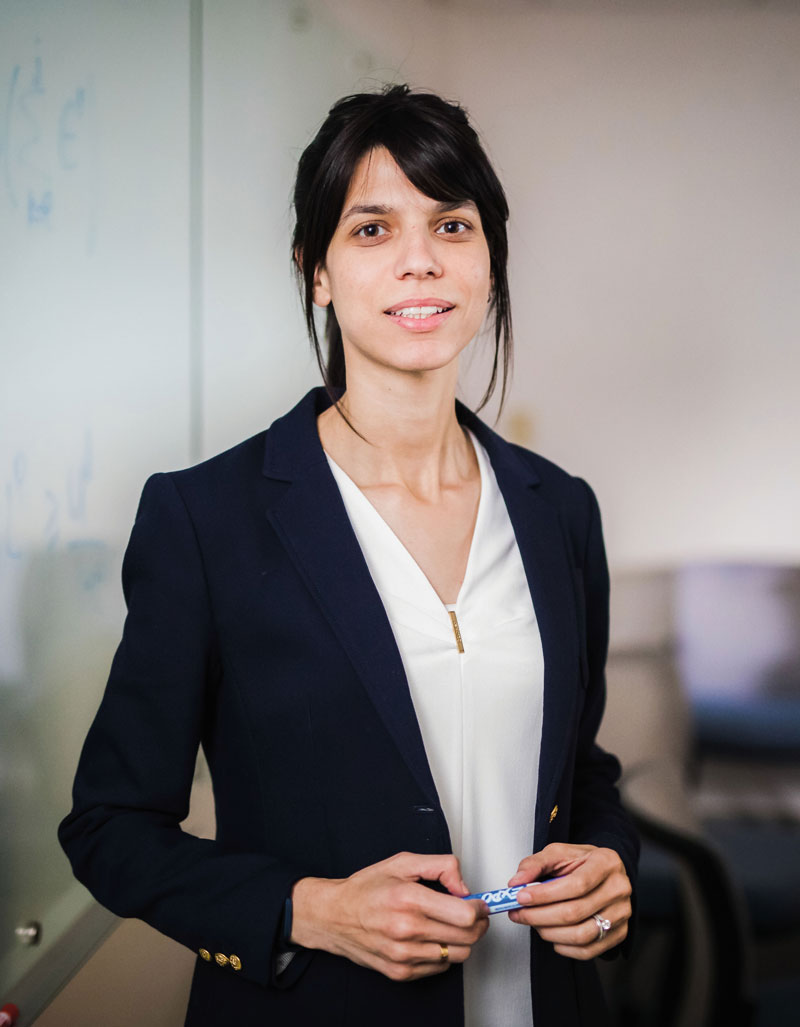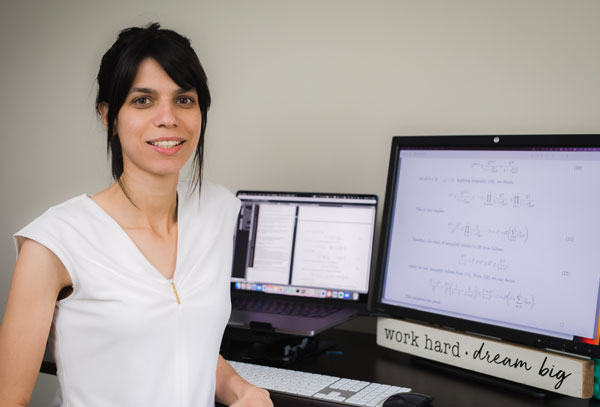 “I am in love with mixed integer programming,” says Karmel Shehadeh. “There’s nothing in this world that’s certain, so I really enjoy it when I solve problems that involve random factors.”
“I am in love with mixed integer programming,” says Karmel Shehadeh. “There’s nothing in this world that’s certain, so I really enjoy it when I solve problems that involve random factors.”
Shehadeh is an assistant professor of industrial and systems engineering (ISE) who joined the Lehigh faculty in August 2020. Her research areas include optimization under uncertainty, as well as mixed-integer programming, scheduling theory, and algorithm development. And the primary application of her work is in health care operations and analytics.
“Health care systems are one of the most complex systems to manage,” she says. “They’re expensive to operate, and there are so many sources of uncertainty like surgery duration, patient arrival, and tight capacity. And we have seen how the health care system pretty much broke down during the pandemic. So the complexity of the system, the unlimited number of research problems, and the impact you can have by solving these problems is what I think attracted me to health care.”
Specifically, she and her team are working on the application of data-driven operations research and optimization methods to address problems around patient and operating room scheduling, ICU capacity planning, hospital readmission, and recently, facility location. By applying her scheduling models for example, she says, hospitals could best determine how many patients a provider sees in a shift, and in what order. And that order is important.
“If it’s done arbitrarily,” she says, “you might allocate 30 minutes for a complex patient who actually needs 40 minutes. The model then could tell you, okay, this type of patient needs 20 minutes, this type needs 30, this type needs an hour. So ideally, if these models are implemented, they can make the system run smarter so that everyone benefits. The provider has enough time with each patient, so there will be better outcomes for the patient and more satisfaction for the provider.”
Shehadeh recently published a book chapter with ISE professor Larry Snyder focused on integrating equity into health care facility location algorithms. They looked at how equity is being modeled and recommended ways to make the models more “inequity averse” to prevent unequal solutions. Which would again, she says, benefit everyone.
“Better models could help the government determine where to locate federally funded facilities,” she says. “They could help private investors who are concerned about equity. For example, if a company wanted to have a mobile outpatient clinic, they could use this inequity averse model to route and schedule the clinics to serve patients in previously underserved areas.”
And, she says, better models could ensure that all patients, regardless of age, gender, location, or socioeconomic factors, have the same access to care.
“There’s a recent report we included in the chapter that showed that in 2020, 20 percent of the population lived far away from COVID-19 testing clinics, while a huge percentage of the population lived within three miles or less. Distance to a facility is just one factor when it comes to equity, but it’s a huge factor.”
As an extension of her equity work, Shehadeh recently supervised a group of women engineering undergraduates as part of the Lehigh Outreach ISE program. One of the program’s initiatives is to expose undergraduates to research. Shehadeh’s student group was tasked with measuring access to hospitals in Pennsylvania. Using ArcGIS mapping software, the students located all hospitals in the state and measured the distance to them from each population center.
 “That helped us learn how many people had access within 10 minutes, within 20 minutes, within 60 minutes,” says Shehadeh. “So that’s step one. The hope is to expand this approach to the entire U.S., and to include a range of health care facilities, including outpatient clinics, blood banks, and trauma centers. These amazing students got the data, cleaned it, added it to the geographical system, created these maps, and ended up with a report that hopefully will be turned into a paper that we can make publicly available to colleagues in the field.”
“That helped us learn how many people had access within 10 minutes, within 20 minutes, within 60 minutes,” says Shehadeh. “So that’s step one. The hope is to expand this approach to the entire U.S., and to include a range of health care facilities, including outpatient clinics, blood banks, and trauma centers. These amazing students got the data, cleaned it, added it to the geographical system, created these maps, and ended up with a report that hopefully will be turned into a paper that we can make publicly available to colleagues in the field.”
Shehadeh is also part of a working group led by Fathima Wakeel, an associate professor in Lehigh’s College of Health, that created a survey to study the various physical and mental health impacts of COVID-19.
“I joined this group a couple of months before I even came to Lehigh, and I’ve really enjoyed learning from everyone. I love solving problems in health care, so it’s been a natural fit for me.”
Another thing she loves is working with—and learning from—her students. “I’m a new faculty member, but so far I have two PhD students at Lehigh, and I’m co-advising two other PhD students at other universities. It’s been great watching them grow and improve as researchers,” she says. “I always say that working with them is the best part of my job.”
—Photos by Christa Neu

